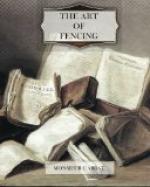All the Secrets in the Thrusts that are given by an able Man, far from being an Effect of the Thrust, is only an Effect of the Occasion, and the Swiftness; or rather of the judgment and Practice: By Means of these Qualities all Thrusts are secret ones, or they wou’d be worth nothing.
All the Thrusts in Fencing are equally good, when they are made according to Rule, with Swiftness, and on the Occasions proper to them; wherefore they ought not to be neglected whilst the Time of learning them offers; not but you may stick closer to some Thrusts than to others, either because you may be better disposed for them, or because you are more used to them.
I thought that after I had exposed the Errors of several Persons, I might tell them, that it is contrary to the Rules of good Breeding, to talk of Things they do not understand; that oftentimes People, by their first Appearance, have been thought to possess the Qualities of knowing Men, but have afterwards forfeited the good Opinion which they had at first imposed on others.
FINIS.
Thrusts of Emulation for Prizes, Wagers &c.
All Thrusts from the Neckband to the Wastband are counted good.
Coup Fourres or interchanged Thrusts are not counted on either side, except one of the Competitors has Recourse to it in order to make the Thrusts equal, then the Thrust of the other is good, and not his.
If one hits the Body and the other the Face or below the Wast at the same Time; the Thrust on the Body is counted, but not the other.
If a Man parrys with his Hand, and afterwards hit, his Thrust is not good, because by parrying with the Hand, his Antagonist’s Foil is less at Liberty than if he had parryed with the Blade, and might be a Reason why he could not parry and risposte.
If a Man takes the Time, opposing with the Left-hand, and hits without receiving, his Thrust is not good, because if he had not Opposed with the Hand, both would have hit, the Opposition of the Hand serving only to avoid, but no way contributing to the Success of the Thrust.
If in parrying, binding, or lashing the Foil, it Falls, and that the Thrust is made without Interval, it is Good.
Thrusts made with the Sword in both hands, or shifting from one Hand to the other are not good.
A Master is not to give judgment for his own Scholar.
FOOTNOTES:
[Footnote 1: The Iron at the End of the Blade that runs into the Handle.]
[Footnote 2: I am not of Opinion that the Body should be drawn back, except it be impossible to avoid the Thrust without doing it; all Parades being best when the body is not disorder’d.]
[Footnote 3: See the 8th. Plate.]
[Footnote 4: See the 12th Plate.]
[Footnote 5: As in this Paragraph, Monsieur L’Abbat rather introduces an Encomium on his Country-men, than any thing essential to the Art of Fencing. I leave the Reader to his own Opinion thereon.]




